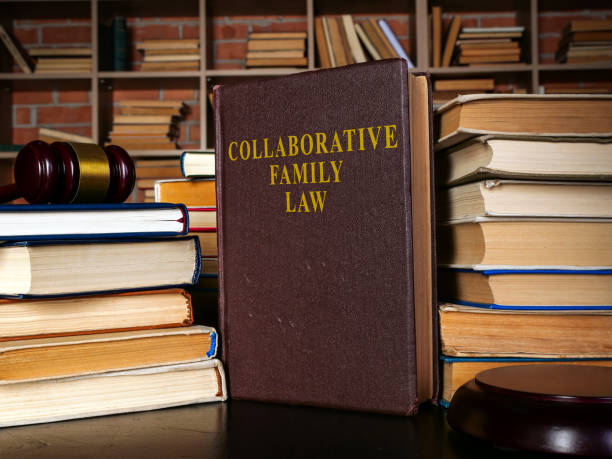Collaborative law is a process that helps couples resolve their family law disputes without going to court. It is a voluntary process that requires both parties to be committed to reaching an agreement. The parties and their lawyers work together as a team to:
- Identify their interests
- Explore options; and
- Negotiate a settlement or participation agreement.
This process is also referred to as collaborative practice or collaborative divorce. It is a form of alternative dispute resolution (ADR) that helps a person and their former partner seek more amicable ways to solve family law matters. Read on to find out more.
Mediation Vs Collaborative Law
Although the collaborative law process and mediation may be comparable, one significant difference is the presence of a lawyer. A mediator – a third party who is impartial in the situation – enables communication between the parties. While assisting the parties in making decisions and resolving disputes, the mediator:
- Maintains an objectivity
- Refrains from giving advice or taking sides
On the other hand, collaborative lawyers are not unbiased in the collaborative law process. They represent each of their individual clients. Each attorney’s primary responsibility is to put their client’s goals and interests first.
How Do Collaborative Law Processes Work?
This process typically begins with an initial intake meeting. In this meeting, the parties and their lawyers get to know each other and discuss the issues in their cases. They also sign a collaborative law agreement, which commits them to resolve their dispute without going to court.
Once the agreement is signed, the parties and their lawyers begin the negotiation process. This process is typically conducted in a series of four-way meetings. This means that all four parties (the two spouses and their lawyers) are present at each meeting.
In these meetings, the parties and their lawyers discuss the issues in their case and work together to find solutions that address everyone’s needs. If the parties are able to reach an agreement, they will sign a settlement agreement. This agreement will typically be drafted by the lawyers and reviewed by the parties before it is signed.
Benefits of Collaborative Law
It offers several advantages over traditional litigation, making it an attractive option for many couples:
Preserving Relationships: Unlike adversarial litigation, collaborative law focuses on preserving relationships rather than tearing them apart. By promoting open communication and cooperation, this process helps minimise the emotional toll and allows the parties to maintain a level of respect and dignity throughout the process.
Empowering Parties: It empowers the parties to actively participate in the decision-making process. Rather than leaving the fate of their dispute in the hands of a judge, the parties work together to find solutions that meet their unique needs and interests.
Cost-Effective: Collaborative law can often be more cost-effective than litigation. By avoiding lengthy court battles, the parties can save on legal fees, court costs, and other expenses associated with traditional litigation.
Efficient Resolution: This process is typically faster than litigation. Parties have more control over the timeline and can work at their own pace, rather than being subjected to court schedules and delays.
Confidentiality: Collaborative law offers a high level of confidentiality. Unlike court proceedings, which are public records, the collaborative process allows parties to keep their personal and financial information private.

The Role of the Lawyers
Family lawyers play a different role than they do in traditional litigation. They are facilitators who help the parties reach an agreement, rather than advocates who represent their clients’ interests in court. This means that the lawyers must be skilled at negotiation and conflict resolution. They must also be able to build trust and rapport with the parties.
The Role of Other Collaborative Professionals and Collaborative Practitioners
In addition to lawyers, other professionals such as financial advisors, child psychologists, and divorce coaches may be involved in the collaborative law process. These professionals can provide specialised advice and support to the parties.
The Costs
Collaborative law is typically more expensive than mediation, but it is generally less expensive than litigation. The costs will vary depending on the complexity of the case and the number of professionals involved.
The Future of Collaborative Law
Collaborative law is a relatively new approach to family law, but it is growing in popularity. It is seen as a more positive and constructive way to resolve family law matters, and it is often more successful than traditional litigation.
How to Get Started?
If you are considering using collaborative law to resolve your family law disputes, there are a few things you can do to get started:
Find a collaborative lawyer: You can find a collaborative lawyer in your area by searching online or by contacting your state or territory’s bar association.
Schedule an initial consultation: During the initial consultation, you will have the opportunity to meet with the collaborative lawyer and discuss your case.
Sign a collaborative law agreement: Once you have decided to proceed with collaborative law, you will sign an agreement. This agreement will commit you and your spouse to resolving your dispute through collaborative law and prohibit you from going to court.
Begin the negotiation process: Once the collaborative law agreement is signed, the negotiation process will begin. This process will typically involve a series of four-way meetings.
Reach an agreement: If the parties can reach an agreement, they will sign a settlement agreement. Lawyers typically draft this agreement on behalf of their clients.

Our Expertise in Collaborative Family Law Practice
JB Solicitors can offer crucial advice throughout the procedure because of their experience in collaborative law and family law. We also provide mediation services that give people a different way to settle conflicts in a fair and cooperative environment.
Clients who choose us can make use of our wide array of services. This includes assistance on child support, child custody, property settlement, and divorce. Our family lawyers can assist clients in navigating difficult family law issues with confidence and help:
- Achieve the best result thanks to their in-depth understanding of the legal system
- Provide individualised counsel; and
- Provide powerful advocacy in family law matters
Message our collaboratively trained lawyers today for your family law matters.
